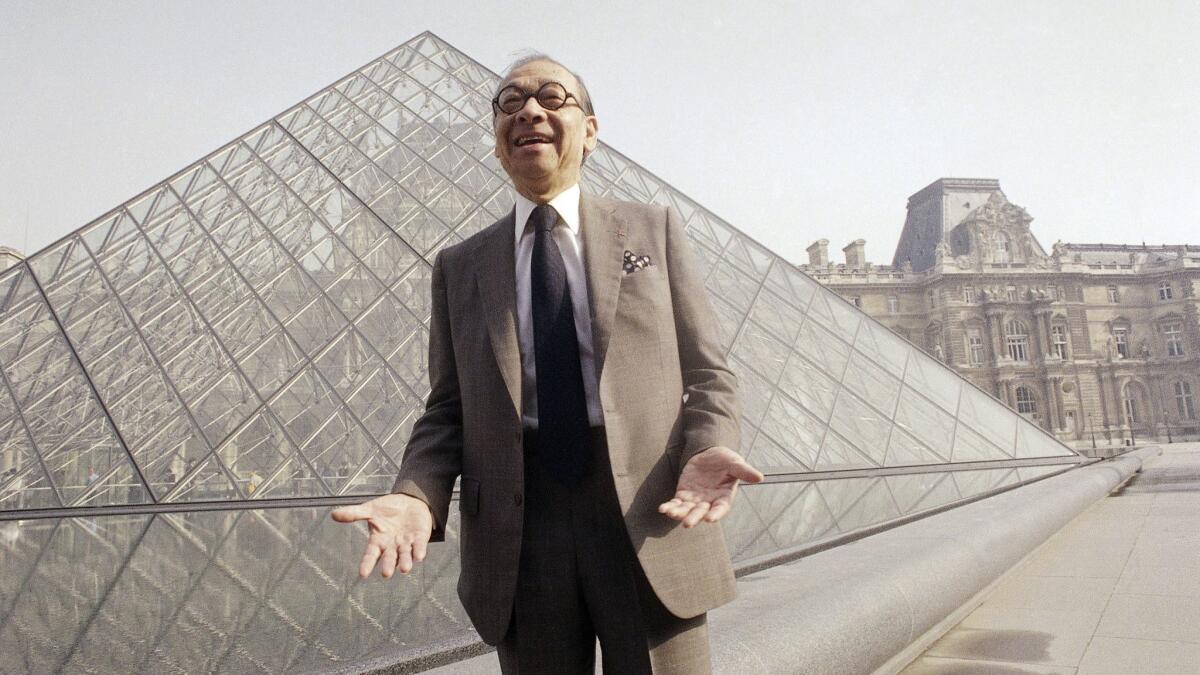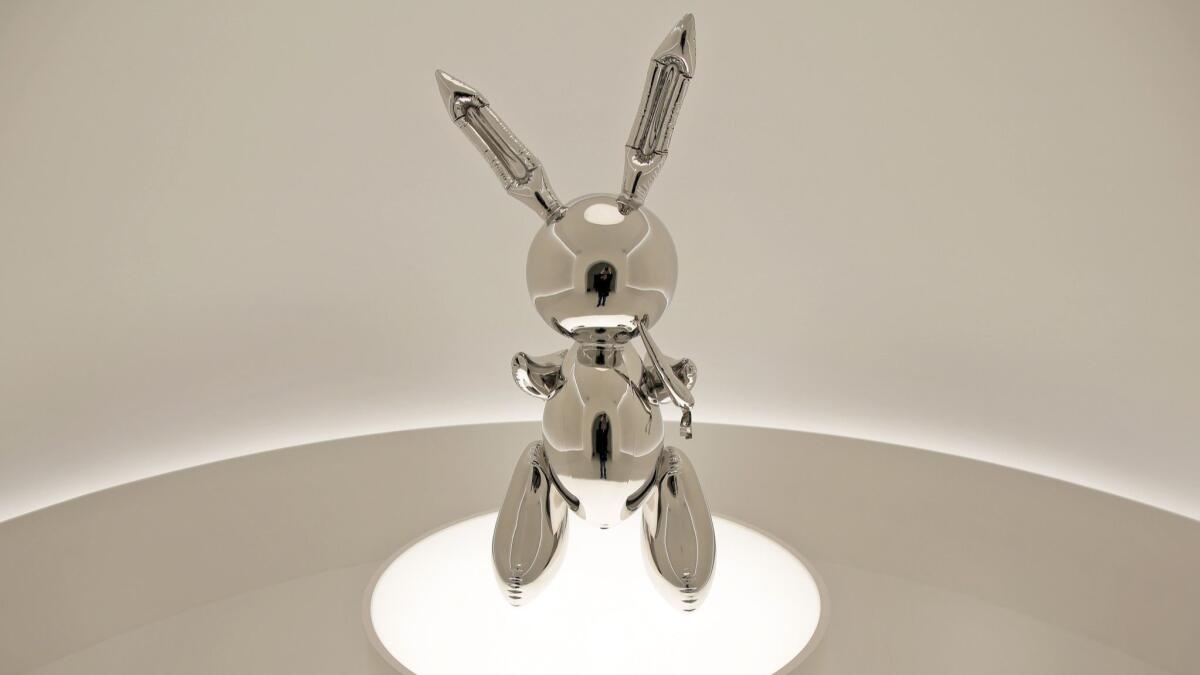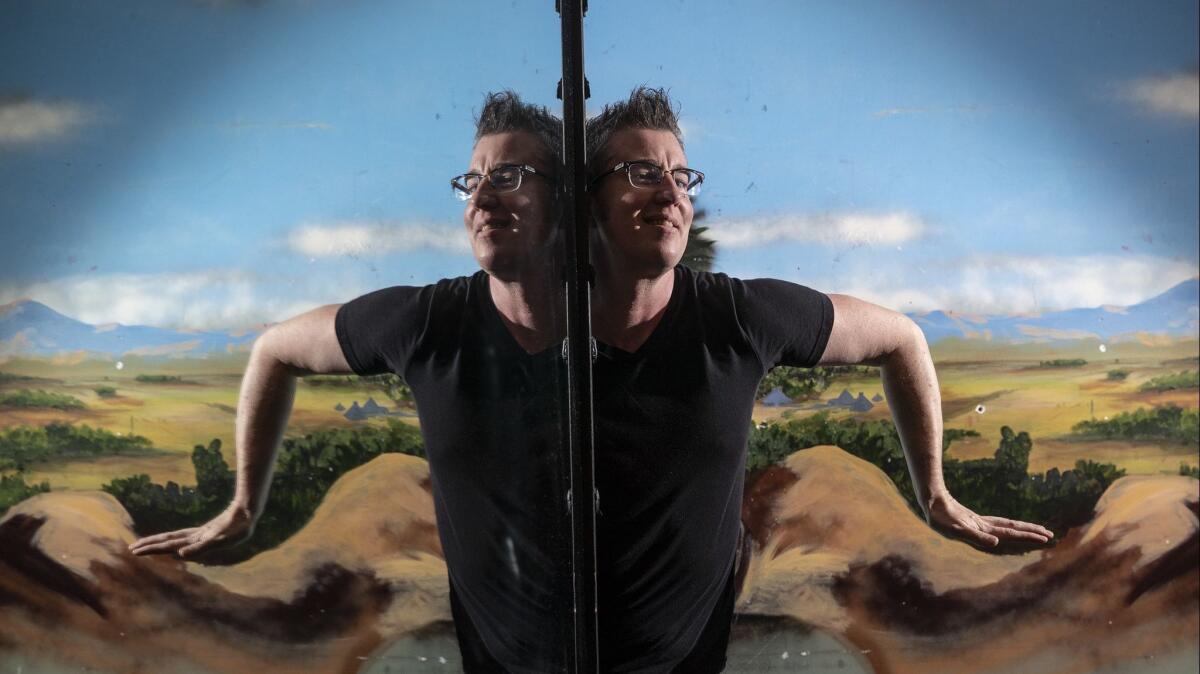Essential arts: Jeff Koons’ $91.1-million ‘Rabbit’ is rich. Is that a good thing?

Carolina Miranda is in Japan this week, leading an architecture and design tour for our own L.A. Times Expeditions. While she explores, let’s talk about the arts closer to home.
The geometry of Pei
The pyramid entrance to the Louvre was far from the only architectural landmark that I.M. Pei designed, but it is the one people have argued about the most. “I consider the Grand Louvre the greatest challenge and the greatest accomplishment of my career,” Pei, who died this week at 102, once told ARTnews. Closer to home, he designed the Rock and Roll Hall of Fame and Museum in Cleveland and the Ronald Reagan UCLA Medical Center. In all his projects, his love of geometric forms came through. “I am not an architect who has a body of theories,” he said. “I don’t think that’s how my architecture should be looked at. But if you are true to yourself, you have a signature, and the signature will come out.”
‘Rabbit’ is rich
After former Goldman Sachs executive Robert E. Mnuchin (father of Treasury Secretary Steven T. Mnuchin) paid $91.1 million for Jeff Koons’ stainless steel sculpture “Rabbit ” — setting an auction record for a living artist — Times columnist Michael Hiltzik wrote that the May 15 sale and related recent “surge in auctions of high-priced artworks ... brings home ... the weakness of arguments against higher marginal income tax rates on the wealthy and against the wealth tax proposed by Sen. Elizabeth Warren.” He adds, “Cocaine is out of favor today, but for the 0.01%, high-priced art has taken its place.”
Meanwhile, Roberta Smith argues in the New York Times that while it’s “easy and fashionable to hate” Koons’ work, “he changed sculpture, bringing together Pop, Minimalism and Duchamp in a new way … elevating overlooked objects.” More important, his “art has proved resistant to easy absorption into art history. We’re still fighting about him.”

Diva power
Jarvis Boyland, a young practitioner of the art form known as diva painting, is having his solo debut at Kohn Gallery with an intriguing collection of images to which, Times art critic Christopher Knight says, “attention must be paid.” The “boudoir compositions of millennial men … gives liberating new meaning to the fraught Western art tradition of the odalisque or harem slave.”
Sculptural poetry
Christopher Knight also took in the Los Angeles debut of artist Miho Dohi at Hollywood’s Nonaka-Hill Gallery. Her sculptures, or buttai (objects), he says in his review, “are like handmade driftwood, a kind of cultural debris that has been carefully shaped into poetic forms by unseen forces. Scrap materials get unexpected new life.”
‘I’m a shapeshifter’
Times reporter Makeda Easter talked with transgender dancer and choreographer Sean Dorsey about finding his way as an artist and the three-year process of developing “Boys in Trouble,” a 22-part dance piece about American masculinity being staged Saturday at Highways Performance Space in Santa Monica. “I never imagined until I was literally in my mid-20s that someone like me could become a professional dancer, let alone a choreographer,” Dorsey said. “And that was because I never saw a single person like me in modern dance.”

Grieving a cellist
An extraordinary night of music and remembrance took place Thursday night at the Renée and Henry Segerstrom Concert Hall when the Pacific Symphony jettisoned its planned “Peter and the Wolf” performance — intended to precede Ravel’s one-act “L’Enfant et les Sortilèges” (The Child and the Magic Spells) — for a musical tribute to principal cellist Timothy Landauer, who died last month of cancer. Music director Carl St. Clair, who hired Landauer in 1991, called him “the soul of the orchestra.” Times classical music critic Mark Swed says the tribute added unexpected layers to the subsequent Ravel performance: “The beauty and depth of this ‘L’Enfant’ is in the orchestra, which made a huge effort to prove it has retained its soul.”
Magic philosopher
“Helder Guimarães is either a magician posing as a philosopher or a philosopher posing as a magician,” writes Times theater critic Charles McNulty in his review of “Invisible Tango” at the Geffen Playhouse’s Audrey Skirball Kenis Theater. “Guimarães looks as though his Tinder profile should read: ‘Quirky creative professional, half egghead, half cut-up.’” Most of all, McNulty says, “he’s excellent company in his new show.”
More theater to check out: Chance Theater’s regional premiere of Kim Rosenstock’s “bumpy but ultimately charming dark comedy “Tigers Be Still,” reviewed by Margaret Gray, and John Bunzel’s “Boxing Lessons” at Hollywood’s New American Theatre, reviewed by F. Kathleen Foley.
Weekend arts
Matt Cooper‘s weekend picks include ballerina Petra Conti’s team-up with the Dream Orchestra, the conclusion of the Los Angeles Chamber Orchestra’s season, the Artsea festival in Marina del Rey and the NCS Fest International Comic Arts Festival in Huntington Beach. If that’s not enough, check his highlights of Southern California theater happenings, dance productions, museum events and classical music performances.
See the most-read stories in Entertainment this hour »
More to Read
The biggest entertainment stories
Get our big stories about Hollywood, film, television, music, arts, culture and more right in your inbox as soon as they publish.
You may occasionally receive promotional content from the Los Angeles Times.











